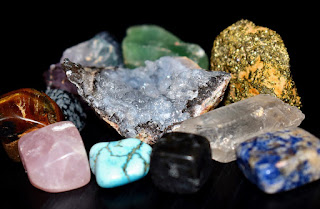This is going to be a weirdly specific rage post. Deal with it.
So, I have been researching folktales, legends, and myths about gemstones for a few weeks now, and I have some things I need to say. To anyone who writes content (digital or print) about "gem lore."
From a professional storyteller and folklore researcher, all y'all. Listen up.
1. CITE. YOUR DAMN. SOURCES!
You might think what you are doing is not academic writing, so why cite anything at all, right? Wrong. If your entire spiel is about the ancient traditions and age-old beliefs surrounding gems, then you better be able to demonstrate that your stories are actually real traditions. Or at least that you got them from somewhere more substantial than the 'gem lore' site directly above yours on the Google hit list.
This is what happens when I search:
- "Oh, look! That sounds like a neat story. I'll look it up in Google Books." (Because I already know better than to do plain Google.)
- First 10 hits: "Crystal Healing", "Lore of Precious Stones", "Crystal Power", etc.
- "Okay, so maybe one of these actually published books cites a source for the myth/folktale/legend I am looking for?"
- No, they don't.
- "Alright, let's try searching pre-1950s, crystals were not a thing yet."
- No trace of the story.
- "Okay, there is no way I have an MA in Roman archaeology and I have never heard of this one oddly specific Roman myth before."
- No Roman primary source databases mention anything of the sort.
- I do, however, start noticing that the story's wording barely changes from book to book, or from website to website. Copy and Paste are at work.
- 4.5 hours in, still no source in sight.
- My hair is turning grey.
Please, for the love of god, or Goddess, or spirits, or angels, or anything that's holy, do your homework before you make claims no one can verify! Primary sources (Ancient Greek or Roman authors, Egyptian papyrus texts, medieval manuscripts, etc.) are best, but sure, I'll take any other publication in a pinch. With a source.
If you don't know the source... try to find it. Or preface with "the Internet claims..."
2. IF IT DOESN'T HAVE A PLOT, IT'S NOT A STORY
The other thing that bugs me. You need to straighten out your terminology. Because most of what is listed under "Legends and Folktales" sections is usually neither.
"Ancient Romans used to believe emeralds improved eye sight" is interesting, it is even verifiable (Suetonius! Is the source!), but it is not a story. It is neither myth, nor legend, nor folktale. It is a belief. Traditionally speaking, beliefs turn into stories when they acquire a plot. Where someone does something once upon a time.
And while we are on this topic:
3. MYTH, LEGEND, AND FOLKTALE ARE NOT ALL THE SAME THING
This is for advanced learners right here, because most writers don't know the difference either. But there is a difference. All of the above belong to the large umbrella of "traditional stories", which means, they have been around for centuries. But.
Myths belong to belief systems and religions, and are (or were) generally believed to be true. Legends were originally religious stories of saints that were also believed to be true. Generally, legends were supposed to be historical - taking place in a more specific past, rather than a mythical past, an attached to historical persons, places, or events. Some languages (like Hungarian) even have separate words for religious and non-religious legends. Folktales are stories that are handed down through generations in the oral tradition. They don't have an author, they exist in many variants, and they change from telling to telling. They take place in a generic "once upon a time world" or simply the human world, and they are usually told as entertainment, rather than plain truth.
So. The tears of Phaethon's sisters turning into amber, when they cry for their brother who tried to drive the sun god's chariot: Greek myth. Polycrates, the tyrant of Samos wearing an emerald ring that is lost and recovered in a stroke of luck: Greek legend. The prince who climbs a mountain of gemstones and rescues an enchanted princess: Greek folktale.
"Fairy tales" can be a sub-genre of folktales (more accurately called wonder tales), but they can also be stories written by someone. Which takes us to...
4. LITERARY TALES ARE NOT ANCIENT
Stories. Written by someone. Are not "ancient lore." Now, I don't actually fault you for this one. Sometimes it is super hard to tell real traditional stories from written ones, especially when the Internet picks them up and throws them around without acknowledging the author. Case in point: the legend of "the maiden Amethyst and Dionysos" I keep coming across is actually not a Greek myth at all. It was invented by a 16th century French poet. It was never the part of the Greek mythical tradition.
Sometimes authors also publish their own stories as "folktales", either because they don't understand the term, or because they think it will sell better. This is how you get hundreds of fake "ancient Chinese wisdoms" and "old Native American legends" and such crap on the Internet.
Which is bad. Because then you are attributing something fake to someone else's tradition.
Which is why you need to check your sources. Full circle!
5. YOU CANNOT BLAME EVERYTHING ON ANCIENT EGYPT
Seriously, just stop.
Whew. Okay. So now I feel better. So I'm gonna end on a positive note:
Researching stories and citing sources is a skill set you can learn. When in doubt, ask a research librarian, a folklorist, an archivist, or a storyteller. We are all happy to help with oddly specific research questions! And the good news is, those stories are out there. And they are marvelous, I promise.










